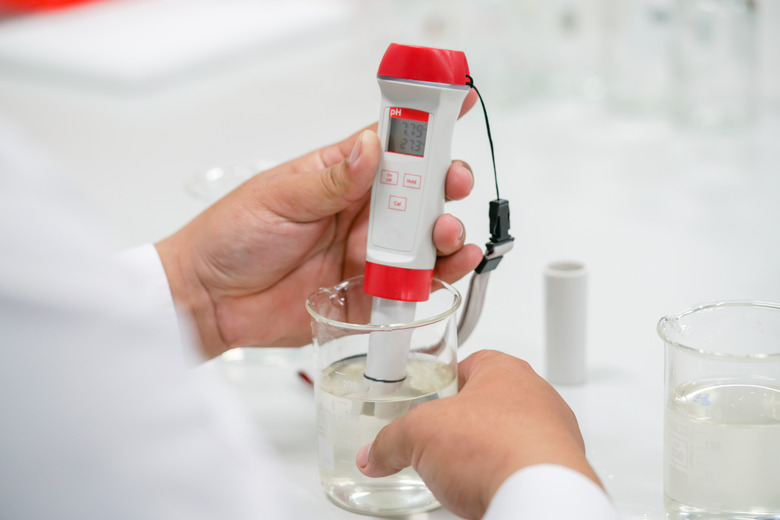Pros & Cons Of pH Meters
The pH of a solution is determined by the concentration of hydrogen ions present. There are different ways to find the pH of a solution, including the using test strips, meters and traditional titration experiments. A meter shows the pH result of a solution instantly on a readable display. Depending on the specific model, the meter may have to be plugged into an outlet or used in the field with batteries. These meters offer a variety of advantages in different industries, depending on the application.
Simple to Use
Simple to Use
One advantage of using a pH meter to measure the acidity of a solution is that it is a lot simpler to use than using test strips or completing a titration experiment. Test strips and titrations both use a color indicator; some people may perceive a different color than the result. A meter will have a few buttons to operate the machine, and gives a result immediately. The result can be given on a digital display, which will provide a more precise result than a test strip.
Calibration Controls
Calibration Controls
Most meters come with the ability to calibrate the device. This is important when conducting research and an accurate result needs to be obtained. If a device is not calibrated correctly, then the result can be skewed. A device that is calibrated on a regular schedule will be usable for years to come. One way to calibrate a pH meter is dip the probe into a buffer solution of a known pH and press the calibration button. The specific buffer pH is inputed into the machine. Consult the operating manual on the specific model you are using for detailed instructions.
Portable
Portable
Another advantage of using a pH meter is that it is portable, and can easily be used in the field. Some research is done in a controlled laboratory; other research is done in the environment. A small battery-operated meter is a very good option when you are hauling other equipment to a specific location. Since the meters are portable, a quality precision instrument is ready to use on site.
Disadvantages
Disadvantages
One downside to using a pH meter is that the cost of the meter is significantly higher than using test strips. The pH meter is a long-term investment for gaining accurate results. For those who are going to be taking an occasional reading, test strips may be a better option. Another disadvantage in using a meter is that it needs to be cleaned regularly to avoid contamination. Most probes have a glass tip that may break or become damaged if exposed to corrosive chemicals. These are just a few considerations to think about before making a substantial purchase of a pH meter.
References
Cite This Article
MLA
Youngker, Andrew. "Pros & Cons Of pH Meters" sciencing.com, https://www.sciencing.com/pros-cons-ph-meters-8703397/. 13 March 2018.
APA
Youngker, Andrew. (2018, March 13). Pros & Cons Of pH Meters. sciencing.com. Retrieved from https://www.sciencing.com/pros-cons-ph-meters-8703397/
Chicago
Youngker, Andrew. Pros & Cons Of pH Meters last modified March 24, 2022. https://www.sciencing.com/pros-cons-ph-meters-8703397/
